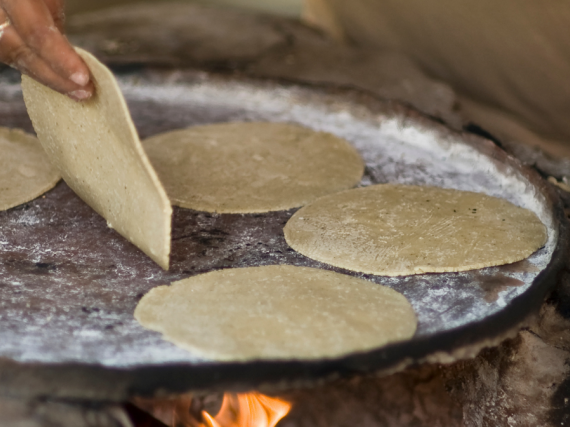The Unacknowledged, Grueling Labor Behind the Mexican Tortilla
In her book “National Dish” Anya von Bremzen asks, “Is the tortilla empowerment or slavery?”
by Jaya Saxena Aug 7, 2023, 4:50pm EDT

When Anya von Bremzen interviewed the women tortilla makers of Oaxaca for her new book, National Dish, she had a consistent question: “Is the tortilla empowerment or slavery?” She was told repeatedly, by home cooks and academics, that traditionally made tortillas were part of the national identity and were Indigenous traditions that needed to be fiercely protected. She found that many families would refuse to eat tortillas made by anyone but the matriarch. Yet the traditional process for making tortillas often leads to shoulder and knee injuries from using the metate, and lung damage from inhaling wood smoke. And von Bremzen found women who, no matter how proud they were of their tortillas, wanted a different future for their daughters.
Feminist and Marxist scholar Silvia Federici argues that housework being seen as an act of love is “one of the most pervasive manipulations” of capitalism. As she writes in Wages Against Housework, even the most exploited workers earn wages, which acknowledge the labor done, and enter the workers into a social contract that allows them to withhold labor if they need to. But housework, including home cooking, is seen as natural, fulfilling work for women, a representation of home and love and family. And if women complain, “we are seen as nagging bitches, not workers in struggle.”
But the fact is, many culinary traditions around the world are traditions of home cooking that were built on this unacknowledged labor. The tortilla is the backbone of food tourism in Mexico, which, as von Bremzen writes, requires Indigenous women’s labor, expertise, and, ultimately, subjugation. I spoke to von Bremzen about the value of tradition, the realities of labor, and whether or not we can create a world in which traditional foodways and liberation coexist.
In National Dish, von Bremzen explores the question of nationality through cuisine. What a “national dish” is depends on the concept of nationhood. Who is included and who isn’t? Whose work is valued? What story does the nation want to tell about itself? Traditions become romanticized and fetishized as these dishes are not just enjoyed within the country, but exported and advertised for profit.
Eater: What differentiates a national dish from something that is simply common or beloved in a certain country or region?
Anya von Bremzen: The idea of a national dish is completely constructed. You had male French gastronomes, like [gastronomical writer] Curnonsky, going around France and picking all these dishes. It’s usually dudes that want these canons. So it’s only later, with the development of the bourgeois cuisine, that we’ll get our domestic goddesses and their kitchen bibles. These narratives certainly ignore all the Indigenous people. Who owns the narrative is always affected by class and race. On top of that, you have all these institutions pushing products and national brands to global consumers. So Korea decides to elevate kimchi, and Thailand promotes pad thai. None of it is accidental.
More:
https://www.eater.com/23823224/national-dish-book-tortilla-women-labor-anya-von-bremzen-interview
